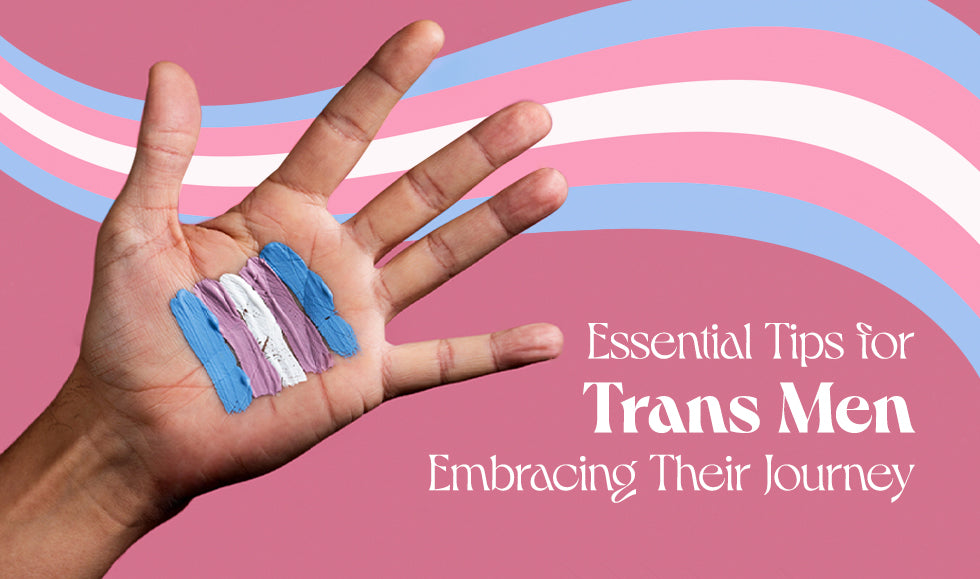Embarking on a journey of self-discovery and identity as a trans man is both a deeply personal and transformative experience. Whether you're just beginning to explore your gender identity or are well into your transition, understanding the complexities and nuances of this journey is essential. This guide offers essential tips to support you as you navigate your transition, cope with physical and emotional changes, embrace your true self, and access the resources you need.
Navigating Your Transition
Early Steps for Trans Men: Understanding What Transition Means
Transitioning is a multifaceted process that involves much more than physical changes; it's about aligning your external presentation with your internal sense of self. For trans men, this can include social, legal, medical, and emotional aspects.
The early stages of transitioning often involve self-reflection and education. It's crucial to explore what being a trans man means to you personally. Understanding that transitioning is not a one-size-fits-all experience will help you make informed decisions that align with your unique needs and goals. Some may choose to pursue hormone therapy and surgeries, while others might focus on social transition, such as changing their name, pronouns, or wardrobe.
It's also important to recognize that there is no set timeline for your transition. Some individuals may move quickly through various stages, while others may take years to fully embrace all aspects of their identity. Give yourself permission to take the time you need to explore and understand what each step means for you.
Finding Support and Building Community for Trans Men
Having a strong support system is essential for any trans person, particularly in the early stages of transition. Surrounding yourself with people who understand and affirm your identity can provide the encouragement and validation needed during challenging times.
Connecting with other trans men through local support groups, online communities, or social media can be incredibly empowering. These spaces offer a sense of belonging and provide an opportunity to share experiences, ask questions, and seek advice from others who have walked a similar path.
Building a supportive network of allies, including friends, family, and mental health professionals, is also vital. Educating those close to you about your journey can foster understanding and empathy, creating a safer and more supportive environment.
Physical and Emotional Changes
Hormone Therapy: What to Expect
Hormone replacement therapy (HRT) is a common medical step for many trans men. This therapy typically involves taking testosterone, which induces physical changes that align your body more closely with your gender identity.
Some of the changes you might experience include a deeper voice, increased body and facial hair, muscle growth, and fat redistribution. These changes can occur gradually over months or years, so it's important to be patient with your body as it adjusts.
It's also essential to have regular check-ups with your healthcare provider to monitor your hormone levels and overall health. Understanding the potential risks and side effects of HRT, such as mood swings or changes in cholesterol levels, can help you make informed decisions about your care.
For those who choose not to undergo HRT, there are still many ways to affirm your gender identity through binding, packing, or dressing in a way that feels comfortable and authentic to you.
Coping with Emotional Shifts
The emotional aspects of transitioning are just as significant as the physical changes. Hormonal shifts, social challenges, and the process of self-discovery can all contribute to a complex emotional landscape.
It's normal to experience a wide range of emotions during your transition, from elation and relief to anxiety and frustration. Developing healthy coping strategies is crucial for managing these emotional shifts. This might include mindfulness practices, journaling, therapy, or connecting with supportive peers.
If you find yourself struggling with anxiety, depression, or other mental health challenges, it's important to seek help from a mental health professional who has experience working with trans individuals.
Embracing Your True Self
Celebrating Milestones in Your Journey
Every step you take in your transition, no matter how small, is a significant milestone worthy of celebration. Whether it's coming out to a friend, starting hormone therapy, or legally changing your name, these moments mark your progress and personal growth.
Creating rituals or commemorating these milestones can be a powerful way to honor your journey. This might involve journaling about your experiences, creating a scrapbook, or even throwing a small celebration with supportive friends and family.
Acknowledging your achievements, both big and small, helps reinforce your sense of identity and builds confidence in your ability to navigate the challenges ahead.
Building Confidence in Your Identity
As you continue to embrace your true self, building confidence in your identity is key. Confidence can take time to develop, especially in a world that may not always be supportive or understanding of trans identities.
One way to build confidence is by surrounding yourself with affirming role models and resources. Reading books, watching films, or following social media influencers who share your experience can provide inspiration and a sense of connection.
Additionally, practicing self-compassion and affirmations can help reinforce your sense of self-worth. Remember that you are valid and deserving of respect, no matter where you are on your journey.
Resources and Support
Connecting with Trans Health Services
Accessing healthcare that is knowledgeable and affirming of your trans identity is essential. Trans-specific health services, including clinics that specialize in transgender care, and even online resources and telehealth services, can provide you with the support and medical expertise you need.
Finding Safe Spaces Online and Offline
Safe spaces, both online (forums, social media groups, and specialized websites) and offline (LGBTQ+ centers, support groups, and events in your area), are crucial for your well-being as a trans man. These spaces allow you to express your identity without fear of judgment or discrimination, providing a sense of security and belonging.

